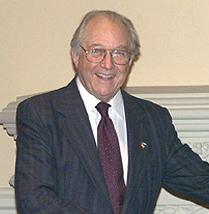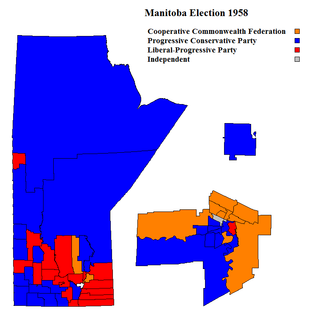Related Research Articles

The New Democratic Party of Manitoba is a social-democratic political party in Manitoba, Canada. It is the provincial wing of the federal New Democratic Party, and is a successor to the Manitoba Co-operative Commonwealth Federation. It is currently the opposition party in Manitoba.

The 2003 Manitoba general election was held on June 3, 2003 to elect Members of the Legislative Assembly of the Province of Manitoba, Canada. It was won by the New Democratic Party, which won 35 seats out of 57. The Progressive Conservative Party finished second with twenty seats. The Liberal Party won two seats.

The premier of Manitoba is the first minister for the Canadian province of Manitoba—as well as the de facto President of the province's Executive Council.
The Progressive Conservative Party of Manitoba is a centre-right political party in Manitoba, Canada. It is currently the governing party in the Legislative Assembly of Manitoba, after winning a substantial majority in the 2016 election and maintaining a majority in the 2019 election.

The 1999 Manitoba general election was held on September 21, 1999 to elect Members of the Legislative Assembly of the Province of Manitoba, Canada.

The 1986 Manitoba general election was held on March 18, 1986 to elect Members of the Legislative Assembly of the Province of Manitoba, Canada. It was won by the New Democratic Party, which took 30 seats out of 57. The Progressive Conservative Party won 26 seats and formed the official opposition. The Manitoba Liberal Party, which had not been represented in the previous legislature, won one seat.

The 1981 Manitoba general election was held on November 17, 1981 to elect Members of the Legislative Assembly of the Province of Manitoba, Canada. It was won by the opposition New Democratic Party, which took 34 of 57 seats. The governing Progressive Conservative Party took the remaining 23, while the Manitoba Liberal Party was shut out from the legislature for the only time in its history. The newly formed Progressive Party failed to win any seats.

The 1977 Manitoba general election was held on October 11, 1977, to elect Members of the Legislative Assembly of the Province of Manitoba, Canada. It was won by the Progressive Conservative Party, which took 33 seats out of 57. The governing New Democratic Party fell to 23 seats, while the Liberal Party won only one seat.

The 1973 Manitoba general election was held on June 28, 1973 to elect Members of the Legislative Assembly of the Province of Manitoba, Canada. It was won by the social-democratic New Democratic Party, which took 31 of 57 seats to win government in its own right for the first time. The Progressive Conservative Party finished second with 21, while the Manitoba Liberal Party took the remaining five. The Manitoba Social Credit Party lost its only seat.

The 1969 Manitoba general election was held on June 25, 1969 to elect Members of the Legislative Assembly (MLAs) of the Canadian province of Manitoba. It was a watershed moment in the province's political history. The social-democratic New Democratic Party emerged for the first time as the largest party in the legislature, winning 28 out of 57 seats. The governing Progressive Conservative Party fell to 22, and the once-dominant Liberal Party fell to an historical low of five. The Social Credit Party won one seat, and there was also one Independent elected.
Morris Abraham Gray was a politician in Manitoba, Canada. He served as a member of the provincial legislature from 1941 to 1966, and was a prominent figure in the province's social-democratic Cooperative Commonwealth Federation (CCF) during this period.

The 1966 Manitoba general election was held on June 23, 1966, to elect Members of the Legislative Assembly of the Province of Manitoba, Canada. It resulted in a third consecutive majority win for the Progressive Conservative Party led by Dufferin Roblin. Roblin's Tories won 31 seats, against 14 for the Liberal Party, 11 for the New Democratic Party and one for Social Credit.
This is a seat by seat list of candidates in the 2004 Canadian election.

Pembina was a provincial electoral division in the Canadian province of Manitoba.
Abram William Harrison was a politician in Manitoba, Canada. He was a member of the Legislative Assembly of Manitoba from 1943 to 1966, initially as a Conservative and later as a Progressive Conservative, after the party changed its name. He served as a cabinet minister in the government of Dufferin Roblin.

The 1958 Manitoba general election was held on June 16, 1958 to elect Members of the Legislative Assembly of the Province of Manitoba, Canada. The election resulted in a minority victory for the Progressive Conservative Party under the leadership of Dufferin Roblin.
The 1953 Manitoba general election was held on June 8, 1953 to elect Members of the Legislative Assembly of the Province of Manitoba, Canada. The election produced a majority government for the Liberal-Progressive party led by Douglas Campbell. His party won thirty-two of fifty-seven seats although with but 39 percent of the vote overall. To date this is the last election in which the Liberal Party won a majority of seats in Manitoba.
Walter Ernest Clark was a politician in Manitoba, Canada. He served in the Legislative Assembly of Manitoba from 1955 to 1958 as a Liberal-Progressive. He was 54 years old at the time of his election, and was a farmer and former municipal official in Baldur.
The Manitoba Cooperative Commonwealth Federation existed from 1933 to 1961, and was the dominant socialist party in the province during its existence.

The Province of Manitoba, similar to other Canadian provinces and territories, is governed through a Westminster-based parliamentary system. The Manitoba government's authority to conduct provincial affairs is derived from the Constitution of Canada, which divides legislative powers among the federal parliament and the provincial legislatures. Manitoba operates through three levels of government: the executive, the legislative, and the judiciary. The executive branch—the Executive Council of Manitoba—consists of the Premier, who is the head of government and the President of the Executive Council. The legislative branch—Manitoba Legislature—consists of the Speaker and elected members, who are served by the Clerk, the Officers of the Legislative Assembly, and the employees of the legislative service. The Legislative Assembly consists of the 57 members (MLAs) elected to represent the people of Manitoba.
References
- ↑ "Historical Summary" (PDF). Retrieved December 5, 2018.